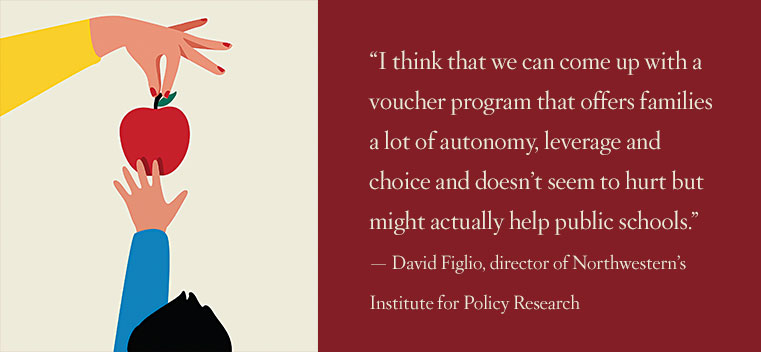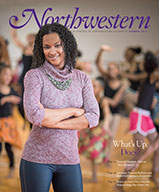
A Voice on Vouchers
Tell us what you think. E-mail comments or questions to the editors at letters@northwestern.edu.
Find Us on Social Media
Professor David Figlio explores the effects on students and schools.
During the contentious confirmation hearing for Secretary of Education Betsy DeVos, a noted school choice proponent, both voucher program advocates and opponents cited research by Northwestern’s David Figlio. The Orrington Lunt Professor of Education and Social Policy and director of Northwestern’s Institute for Policy Research, Figlio is a leading expert on school vouchers and their effects. He has studied two of the largest school voucher programs in the country — the Florida Tax Credit Scholarship Program and Ohio’s Educational Choice Scholarship (EdChoice) Program.Figlio, who is a member of the executive team of the National Center for Analysis of Longitudinal Data in Education Research, has studied school choice for more than 20 years and served for nearly a decade as the official independent evaluator of Florida’s voucher program, which launched in 2002. More recently, the Thomas B. Fordham Institute contracted with Figlio to independently review the Ohio system. He issued his report last July.
Figlio has been exploring two key questions: What are the effects of receiving a voucher for the participants themselves? And what are the overall effects of having a voucher program on public schools? School voucher proponents argue that vouchers provide increased opportunities for disadvantaged students and that voucher programs provide competition to public schools, driving them to improve.
In Florida, where the voucher program serves disadvantaged children, as determined by household income, Figlio’s research with former IPR colleague and School of Education and Social Policy student Cassandra Hart ’11 PhD showed that students who go to private schools on vouchers did no better or worse on average than the kids who stayed in the public schools. (Hart is now an assistant professor at the University of California, Davis.)
His data indicated that in Ohio, where voucher eligibility is determined by state measures of school performance, students who moved to the private sector performed worse than they would have had they remained in the public system. “If people think these private schools are going to be a panacea for these kids, they have to confront the fact that the best of the evidence is seeing little difference and the less optimistic of the evidence is saying that the kids might actually get hurt in literacy and numeracy if they go to private schools,” Figlio points out.
However, despite the misperception that vouchers will destabilize public schools by reducing funding and driving away good students, Figlio says that competitive pressure from small-scale, targeted voucher programs makes public schools perform better in some cases.
“It’s not Earth shattering,” he says. “There is no evidence of a revolution going on. But at the same time, there is no evidence that public schools are being hurt. The scale of the programs I’ve researched in Florida and Ohio [which serve roughly 3 to 5 percent of the population] just wasn’t big enough to hurt the public schools.”
Figlio explains that vouchers targeted at disadvantaged students attract the lowest-performing students rather than the highest performers, contrary to many fears. Voucher programs, he says, provide a private alternative to students who do not fit in the public schools and may have been disruptive in that setting. “So it could be that if the public schools are serving people for whom the public school is a better match, that could make everybody easier to educate,” he says.
Figlio, who presented his recent research on school voucher programs in Ohio and Florida in early February during a forum at the Thomas B. Fordham Institute in Washington, D.C., says there is room for accountability measures on private schools that are taking public money through voucher programs. The distribution of quality among private schools convinced Figlio that there is a role for oversight, “to help monitor schools that seem to be popping up to Hoover up and take in voucher students.”
He says public money is used for private preschool and private higher education, including at Northwestern. Why, he asks, is K-12 considered differently?
“One thing that happens with schooling is that there is a certain set of standards and skills, social norms and values that we want to make sure all children know,” he says. “But I think we can solve that by insisting that all schools using taxpayer dollars have to adhere to at least some common standards.”
Figlio, who will become dean of the School of Education and Social Policy on Sept. 1, urges voucher opponents to keep calm. “The devil is in the details,” he says. “I think that we can come up with a voucher program that offers families a lot of autonomy, leverage and choice and doesn’t seem to hurt but might actually help public schools. There is evidence that we can do that if we are targeting the vouchers at disadvantaged families, keeping the voucher programs pretty small and holding participating private schools accountable for the education they provide.”



 Facebook
Facebook Twitter
Twitter Email
Email


